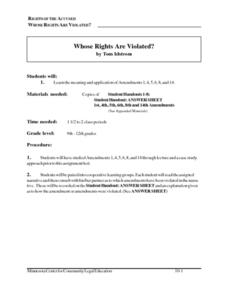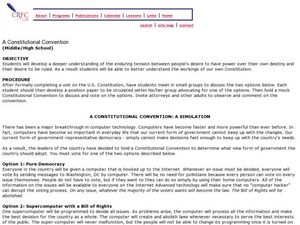Curated OER
Double Jeopardy Clause: A Fifth Amendment Constitution Trivia Game
Here is a wonderful way to introduce your learners to the Fifth Amendment of the Bill of Rights. There are 16 questions designed to generate thinking and discussion questions about the Fifth Amendment. This instructional activity is...
Curated OER
Case Studies on the Sixth Amendment
Students trace the historical background of the sixth Amendment to the Constitution. They identify the legal issues and legal arguments in the cases studied, and evaluate the court's decisions.
Judicial Learning Center
Types of Court Cases
How can one court acquit someone of a crime, while another convicts the person of the same one? It's all because of the differences between civil and criminal trials. An informative resource provides scholars in the field of criminology...
State Bar of Texas
Hernandez v. Texas
What if the jury is not made up of people from your ethnicity or background—are they still considered your peers? Scholars analyze the impact the Supreme Court case Hernandez v. Texas had on jury selection across the nation. Paired...
Curated OER
Whose Rights Are Violated?
Learners examine the 1st, 4th, 5th, 6th, 8th and 14th Amendments to the Constitution. They work with a partner to determine which amendment has been violated while working on a worksheet.
Curated OER
Racial Discrimination and the Death Penalty
Available on RTF file. Students study race and its relationship to the death penalty. Students also review court cases and constitutional amendments related to racial discrimination.
Curated OER
People's Rights Change With the Decisions of the Courts
Ninth graders research the Bill of Rights, and the difference between a conservative and a liberal court decision. They examine how peoples' rights are expanded or limited by court decisions.
Curated OER
Ex Parte Milligan
Middle schoolers reserach the case of Ex Parte Milligan. They explore the influence of the Supreme Court and the court decisions on the rights and responsibilities of citizens. They read Milligan's letter to Stanton and generate...
Curated OER
Banned Book Week: Tips for Teaching Censorship
Consider how book censorship erodes our right to free speech and intellectual freedom.
Curated OER
A CONSTITUTIONAL CONVENTION: A SIMULATION
Students discuss two computerized options to change the current U.S. government. In this Constitutional Convention lesson, students write a statement advocating for one of the choices and participate in a mock modern Constitutional...
Other
Us Courts: Sixth Amendment Activities
Activities for the classroom in which students apply landmark Supreme Court cases to contemporary scenarios related to the right to counsel and right to a fair trial. With plan for teachers, word bank, and links to related resources.
iCivics
I Civics: Miranda v. Arizona (1966)
This mini-lesson covers the basics of the Supreme Court's decision that prohibited a suspect's statements from being used as evidence unless the suspect has been advised of his or her rights to remain silent. Middle schoolers learn about...
iCivics
I Civics: Gideon v. Wainwright (1963)
This mini-lesson covers the basics of the Supreme Court's decision that gave defendants in state criminal courts the right to a lawyer. Students learn about the 6th Amendment right to a lawyer, why the right is important, and how the...
CommonLit
Common Lit: "You Have the Right to Remain Silent": History of Miranda Rights
Can your rights protect you if you don't even know what they are? Supreme Court case Miranda v. Arizona answered that question by requiring police officers to read the "Miranda Rights" when making an arrest. This text will explain the...
Thomson Reuters
Find Law: u.s. Supreme Court: Escobedo v. Illinois (1964)
A detailed description of the United States Supreme Court decision on the appeal of the case Escobedo v. Illinois, which ruled on the right to have counsel under the 6th and 14th Amendments to the Constitution.
Annenberg Foundation
Annenberg Classroom: Right to Assistance of Counsel
Check out this interactive timeline of the history of right to assistance of counsel in the United States.













